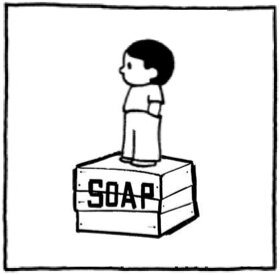friday 5 | piracy, digital bootlegging, & p2p online in china ::
Saturday, July 4th, 2009:: from “shanzhai” iPhones to the Shanghai Government bootleg edition of Windows XP, knock-offs and intellectual property violations are a part of life on the Chinese mainland. The below five-point brief provides some context to how Chinese netizens use the Internet to find, download, and share bootleg / pirated content.
why bootleg / pirate content online in China?
A few years ago in China, if you wanted to watch a movie you could go to the nearest supermarket, where a guy with a cardboard box of DVDs would be standing outside the front door. You’d rifle through the collection and pick out a selection of titles that caught your interest, and then go back home and see which ones would actually work in your DVD player. But with increasingly speedy Internet connections in China today and the wealth of content available online, why pay for pirated DVDs of uncertain quality when you don’t have to? More and more Chinese Internet users are no longer turning to the “the DVD guys / shop on the corner.” Movies are just the tip of the iceberg – music, TV shows, animation, games, software, and magazines are all easily available online for free. Sure, there’s something called “copyright law” which makes downloading this content slightly against the law, but everyone else is doing it, and when the government mandates the use of software despite allegations that it contains pirated code (see the recent Green Dam debacle), it makes you wonder how seriously any of this really is. Software piracy has been dropping over the past few years, but is still quite high: According to a BSA survey, China’s piracy rate for software was 80% in 2008, down from 90% in 2004. Arguments can be made that software piracy hurts the domestic software industry, and the same argument could be made for bootlegs in other sectors. But the combination of easy + free makes bootleg information very attractive to China’s netizens, obviously.
what can you pirate online in China?
VeryCD provides a searchable archive of digital information and content along with an active community of peer-to-peer (P2P) file-sharers. It doesn’t host any of the files itself – instead, it links to files that allow netizens to download bootlegged content from other netizens. The front page of VeryCD prominently features movies and music, but the site indexes a wide range of materials. The categories listed in the sidebar are movies, TV series, music, games, animation, art, software, and “resources,” a category that encompasses anything from instructional DVDs to PDFs of magazine scans. One of the things that VeryCD brought to file sharing was a charter for sharing mp3 collections. Titles, format, tags, and packaging were all standardized, and the idealistic goal of the site’s “MP3! Project” was for “every individual to share two or three albums to establish the largest mp3 music library in the P2P world.” Because the eMule system (see below) does not have any central file repositories but relies on users themselves to share files, participants in the “MP3! Project” are requested to share a few albums long-term so that they’ll always be accessible to other netizens in search of them. Xiami is a music sharing platform. The website provides a substantial archive of music for online listening through Xiami.FM, a music widget, but it also offers Shark, a P2P application designed for sharing music libraries with other Xiami users . Users who download and install the software achieve far better speeds on future music downloads, and they can broadcast songs they possess that are not present in Xiami’s own library to other users. Kugou is a similar service that has been around for years, and there is a wealth of smaller services around as well. A number of services have arisen to serve movies and TV shows over P2P services. Poco’s movie channel and PP365 are two examples; each requires installing a proprietary piece of software that handles the movie download process. There are, of course, legitimate uses of this technology – streaming authorized television programs or movies for which permission has been received, but, it safe to say, that doesn’t make up the majority of use.
how do you pirate online in China? ::
P2P software – an application that transfers files to a netizen’s computer from the computers of other netizens directly, rather than pulling content from a central location – is frequently used for sharing pirated data. The files indexed on VeryCD are shared through the eMule program, and the site provides its own version of the application: EasyMule. The software registers its own protocol (ed2k) with the users’ web browser so that links to resources are automatically passed to the eMule program, which then searches for the content on other users’ machines. Other eMule-related services include Vagaa (哇嘎), which provides its own application that promises accelerated eMule and BitTorrent downloads, as well as its own proprietary file download service. The China eMule (中国电骡) is an almost identical copy of the Vagaa homepage and offers links to the Vagaa application and shared files but does not seem to be related to Vagaa – a bootleg of a bootleg service? All very dodgy. BitTorrent is another file sharing protocol. Netizens access a seed file (with the extension .torrent), and their BT application connects to a tracker to find out which other users (known as peers) are sharing the file. Once peers are identified, the BT application downloads that file bit-by-bit from multiple users. The BT@China Alliance unifies several dozen smaller BBS discussion forums where netizens post the locations of BT seed files (which can essentially be anywhere). BT@China is searchable by keyword, file name, or “hash” – a unique ID that identifies a specific file for download. Xunlei, also known as “Thunder,” is one of the most popular file sharing services. It’s a combination of proprietary software and a group of associated websites, but it is also shunned by more civic-minded P2P users for enabling “leeching”: the software is designed to allow users to suck bandwidth by downloading from BT or eMule networks without contributing a corresponding amount of uploaded information. This goes against standard / culture of file-sharing etiquette and may result in users of these programs getting banned from central servers. Xunlei also provides a website for online viewing of HD videos served through the software from its own network rather than individual users’ machines. Google owns a small stake in Xunlei, and the software is part of Baidu’s search alliance, which embeds a Baidu search bar into the program. As a testament to its popularity, Xunlei is a perennial entry on Baidu’s rankings of top search terms. It’s currently at #15.
what else can you pirate online in China? ::
There’s niche pirating going on as well, although not much of it is large enough in size to require the use of P2P transfers. Academic publications, for example, can be prohibitively expensive if your university doesn’t subscribe, so communities have sprung up to fill the need for reduced-cost or free academic books and journals. From time to time people will discover loopholes or back doors in online journal archives, and they’ll share the technique on a forum like Pet2008, one of the major communities for academic journal sharing. Other times, a student or faculty member at a university that subscribes to a particular archive will set up a proxy service to allow off-campus netizens access to an on-campus IP address, which will get them into the archive. This is very common. The Yuyu College forum has a page for “free access” that lists a number of these servers. The practice has developed its own economy: payment in virtual currency is required to read many of the posts, and netizens earn credits by posting resources or purchasing them outright, but the cost is far less than what legitimate access to academic archives would require. Namipan is a file host that uses its own proprietary software and protocol, as well as offering slower, less reliable web-based downloads. Users upload files to the Namipan servers, and when other netizens wish to download them, their web browser will hand off the link to the Namipan download application (like many of these programs, the interoperability is seamless for IE users but less reliable for users of other web browsers). All kinds of information is shared this way, from music albums to book scans – a scanned Chinese edition of the mainland China-censored Zhao Ziyang memoir was available on Namipan right after it hit the streets. Damipan (大米盘), whose name seems inspired by Namipan, does not have its own download application but allows users to share files through various protocols, including eMule and Xunlei. Many of the most popular file sharing sites restrict the quantity of data unregistered users can download, and a fair number of them have policies in place that remove pornographic material. So porn is frequently shared through BitTorrent, with the .torrent seed files uploaded to a file sharing site. Or else they’re simply shared through Xunlei. See the movie download sections of overseas sites like 92xxoo or Xiao77 (a well-known site that frequently changes IP addresses and URLs to ensure easy access from mainland porn enthusiasts). For those that thought the Chinese Internet has been thoroughly scrubbed of politically sensitive, pornographic, or otherwise “unharmonious” content, think again. It’s all readily available to the average Chinese netizen.
does pirating in China ever suck? ::
Installing programs designed to facilitate the sharing of copyrighted material has always come with an element of risk. eMule is known to be free of adware and spyware, but because it is an open source program, other providers are able to offer their own eMule packages that may include dodgier add-ons. Apart from coming bundled with adware and dodgy browser redirects, Xunlei’s implementation of its own P2P network came under fire for consuming all of its user’s upload bandwidth: the program would scan a user’s entire hard drive and upload files that other Xunlei users are requesting. Users would unwittingly max out their bandwidth. In the face of widespread user dissatisfaction, the company tweaked the software to throttle uploads. Tuotu (脱兔) was launched by developers who liked the Xunlei software itself but were disgusted by the way the associated service leeched files from other archives. It supports a number of popular sharing protocols including eMule and BT, but doesn’t seem to have any source of income at the moment, or much to distinguish it from all of the rest of the marketplace. One additional problem – more of an annoyance, really – comes when the ISP gets tired of downloaders hogging bandwidth and throttles the standard ports that many protocols use. It’s a game of cat-and-mouse: in response to ISPs placing limits on standard eMule ports, the software now comes with options to choose random ports in the hopes that the ISP will simply ignore the gigabytes of IPR infringing content you’re copying to your hard drive.
// AjS
[Friday 5 is the product of my work at Edelman Digital (China). Link here for the full Friday 5 archive. If you'd like to be added to the bilingual (English & Chinese) Friday 5 email distribution list, please send me an email at: adam DOT schokora AT edelman DOT com.]

 :: the topic for this week’s Friday 5 comes from my colleague (and former United States Ambassador to Singapore, 2001 – 05) Frank Lavin, based in Edelman’s Hong Kong office. Thanks Frank. If any readers have any ideas for future Friday 5s, please send through.
:: the topic for this week’s Friday 5 comes from my colleague (and former United States Ambassador to Singapore, 2001 – 05) Frank Lavin, based in Edelman’s Hong Kong office. Thanks Frank. If any readers have any ideas for future Friday 5s, please send through.


































